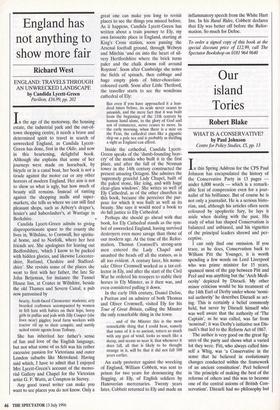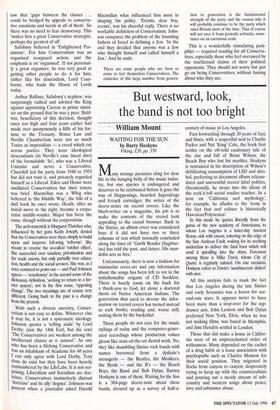Our island Tories Robert Blake
WHAT IS A CONSERVATIVE? by Paul Johnson
Centre for Policy Studies, £5, pp. 13
In this Spring Address for the CPS Paul Johnson has encapsulated the history of the Conservative Party in 13 pages under 6,000 words — which is a remark- able feat of compression even for a jour- nalist of his brilliance. But of course he is not only a journalist. He is a serious histo- rian, and, although his articles often seem coloured by apoplectic fury, he lays it aside when dealing with the past. His study of what has shaped Conservatism is balanced and unbiased, and his vignettes of the principal leaders shrewd and per- ceptive.
I can only find one omission. If you trace, as he does, Conservatism back to William Pitt the Younger, it is worth spending a few words on Lord Liverpool who was prime minister for 15 years, spanned most of the gap between Pitt and Peel and was anything but the 'Arch Medi- ocrity' depicted by Disraeli. My other minor criticism would be his treatment of the 14th Earl of Derby under whose 'nomi- nal authority' he describes Disraeli as act- ing. This is certainly a belief commonly held, but never by Disraeli himself who was well aware that the authority of 'The Captain', as he was called, was far from 'nominal'; it was Derby's initiative not Dis- raeli's that led to the Reform Act of 1867. The author is very good on the great fig- ures of the party and shows what a varied lot they were. Pitt, who always called him- self a Whig, was 'a Conservative in the sense that he believed in evolutionary changes conducted within the framework of an ancient constitution'. Peel believed in 'the principle of making the best of the reforms of others and this was to become one of the central axioms of British Con- servatism'. Disraeli had no philosophy but saw that 'gaps between the classes ... could be bridged by appeals to conserva- tive emotions and needs in all of them'. So there was no need to fear democracy. This `makes him a great Conservative strategist, perhaps the greatest of all'.
Salisbury believed in 'Enlightened Pes- simism'. For him Conservatism was an organised rearguard action; and the emphasis is on 'organised'. If not personal- ly a great organiser, he was very good at getting other people to do it for him; rather like his descendant, Lord Cran- borne, who leads the House of Lords today.
Arthur Balfour, Salisbury's nephew, was surprisingly radical and advised the King against appointing Curzon as prime minis- ter on the ground that he was a peer. Bald- win, beneficiary of this decision, thought taxes too high and four years earlier had made over anonymously a fifth of his for- tune to the Treasury. Bonar Law and Neville Chamberlain were not so much Tories as imperialists — a creed which cut across parties. They were ideological descendants (in Neville's case lineal also) of the formidable 'Jo', who was a Liberal Unionist and never a Conservative. Churchill led the party from 1940 to 1955 but did not trust it, and privately regarded himself as a Liberal. Eden and Home were undiluted Conservatives but their tenure was brief. Macmillan was a Whig who believed in 'the Middle Way', the title of a dull book he once wrote. Heath, after an initial move to the right, became a corpo- ratist middle-roader. Major has been the same, though without the corporatism.
The arch-maverick is Margaret Thatcher who, influenced by her guru Keith Joseph, denied that the Conservatives were there simply to build upon and improve left-wing 'reforms'. She meant to reverse the so-called 'ratchet effect'. She succeeded over taxation, privatisation and the trade unions, but only partially over educa- tion, health and the social service& She was, as I once ventured to point out — and Paul Johnson agrees — 'reactionary' in the second sense of the dictionary definition, 'seeking to return to a for- mer system'; not in the first sense, 'opposing change'. The two meanings are of course very different. Going back to the past is a change from the present.
With such a diverse ancestry, Conser- vatism is not easy to define. Whatever else it may be, it is not a systematic ideology. Johnson quotes a 'telling aside' by Lord Derby: (not the 14th Earl, but his son) The Conservatives are. weakest among the intellectual classes as is natural.' As one who has been a lifelong Conservative and was an inhabitant of Academe for 40 years I can only agree with Lord Derby. Tory dons do exist but they have been heavily outnumbered by the Lib/Labs. It is not sur- prising. Liberalism and Socialism are doc- trines. Conservatives instinctively distrust doctrine' and its ally 'dogma'. Johnson was Present when a journalist asked Harold
Macmillan what influenced him most in shaping his policy. 'Events, dear boy, events', was his cheerful reply. There is no workable definition of Conservatism. John- son compares the problem of the founding fathers of Israel in defining a Jew. 'In the end they decided that anyone was a Jew who thought himself and called himself a Jew.' And he ends:
There are some people who are born or come to feel themselves Conservatives. The existence of this large number from genera- tion to generation is the fundamental strength of the party and the reason why it will probably continue to be the party which rules Britain most of the time. That of course will not save it from periodic setbacks, some- times on an enormous scale.
This is a wonderfully stimulating pam- phlet — required reading for all Conserva- tives, especially those who feel overawed by the intellectual claims of their political opponents. They should not worry but just go on being Conservatives, without fussing about who they are.



































































 Previous page
Previous page